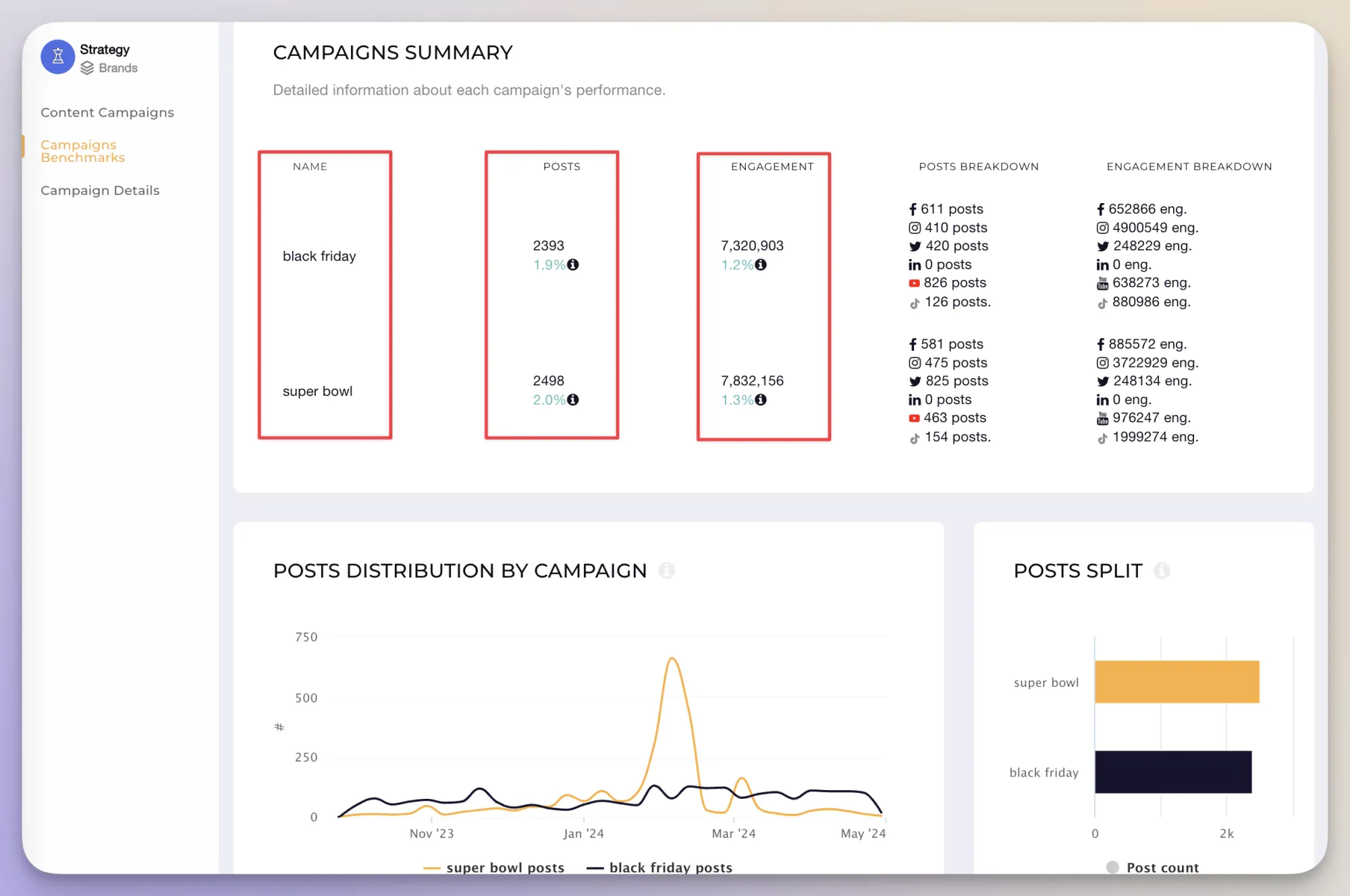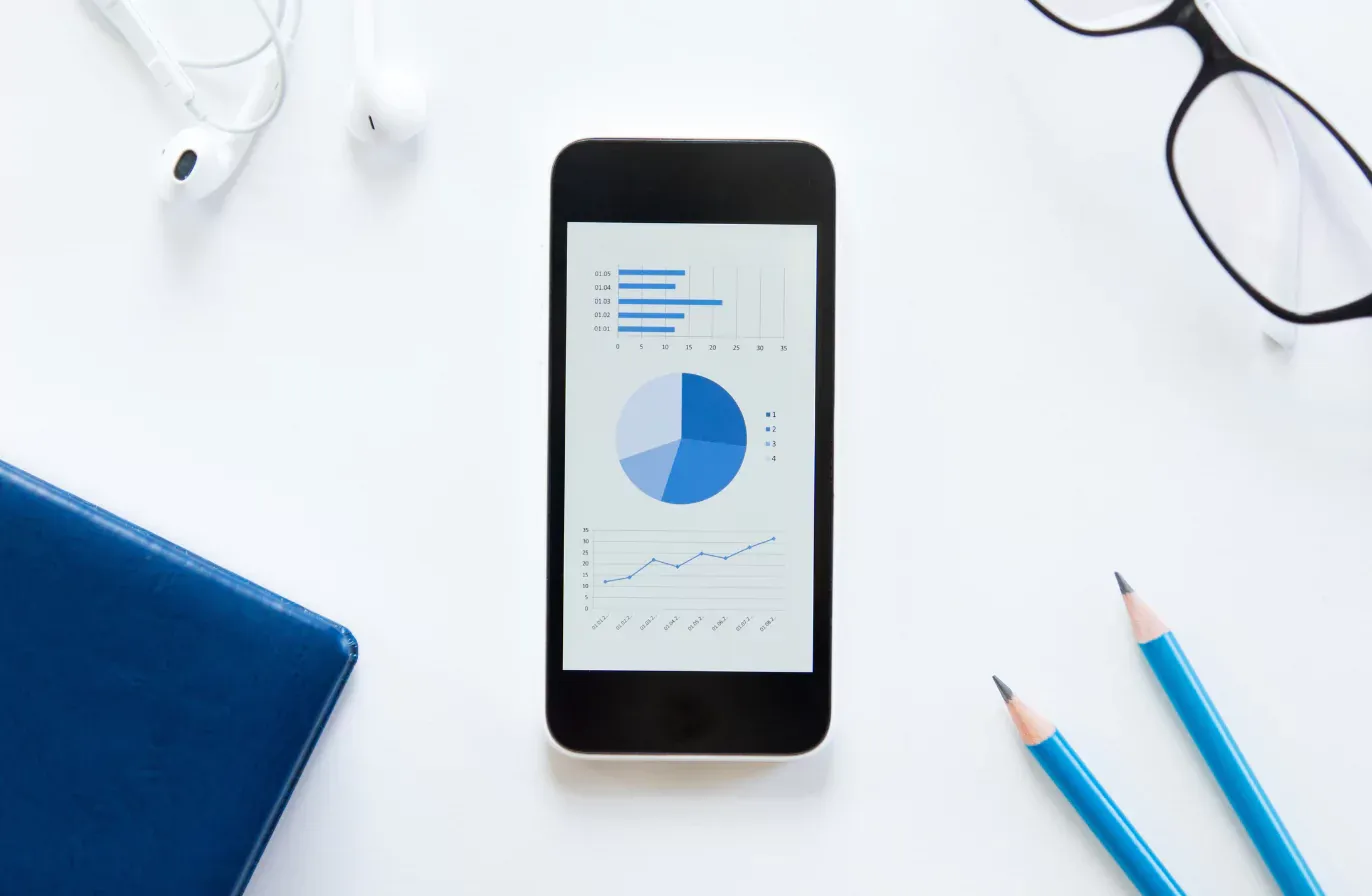Feeling lost when looking at your social media analytics? Posting content is great, but knowing if it's reaching the right people and engaging them is even better.
Social media measurement helps you avoid the frustration of fumbling in the dark and helps you optimize resources.
Media measurement tools track what's working and what's not so you can build and adjust your social media strategy based on real data. It helps you extract both short-term insights into campaign performance and long-term trends that can support business growth.
This article will help you understand the best practices and challenges of social media measurements and give you the tools to make data-driven decisions.
Table of Contents
What is social media measurement?
Two types of social media measurement
6 benefits of using social media measurement
6 steps to get started with social media measurement
FAQs about social media measurement
What is social media measurement?
Social media measurement goes beyond simply tracking activity. It's the process of analyzing data to understand the impact of your social media marketing efforts.
By using goal-specific metrics like reach, engagement, and conversion rates, businesses can understand the effectiveness of their strategy and identify areas for improvement. This data-driven approach helps companies optimize their social media presence and achieve their marketing goals.
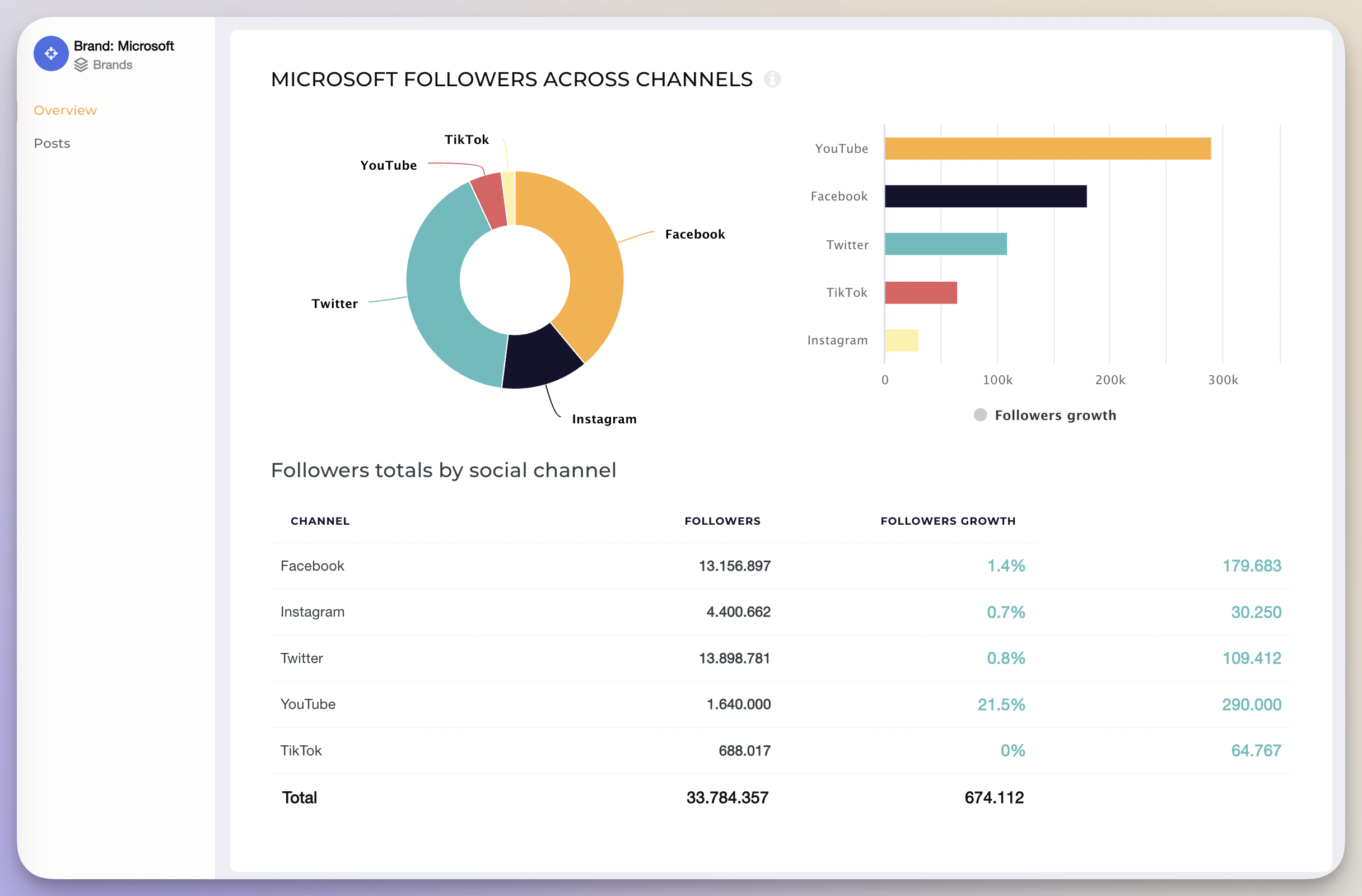
Measure your social media performance with Socialinsider
Analyze your social media performance across channels and compare it against top competitors.
Start a 14-day FREE trialThere are 2 types of social media measurement
Social media measurement is not a one-and-done deal.
It's not enough to generate a report for a stakeholder presentation and then forget about it for months. In order to meet your social media marketing goals and optimize your social media ROI, you must constantly track analytics.
To make better sense of all the data, it helps to categorize media measurement as follows:
#1. Continuous tracking
Continuous tracking means examining certain social media analytics on an ongoing basis. This type of measurement provides a long-term view of your social media performance and helps you identify trends, patterns, and overall growth.
Social media media measurement metrics to include in ongoing analytics:
- Reach metrics which help you understand how many people are seeing your content.
- Engagement metrics, such as likes, shares, or comments, measure the level of interaction your audience has with your content.
- Social sentiment analysis involves assessing how your audience perceives your brand and if the tone of their conversations is changing over time.
Regularly monitoring these metrics gives you a view of social media performance at any moment in time and lets you know if something is amiss and needs fixing or if you are moving in the right direction.
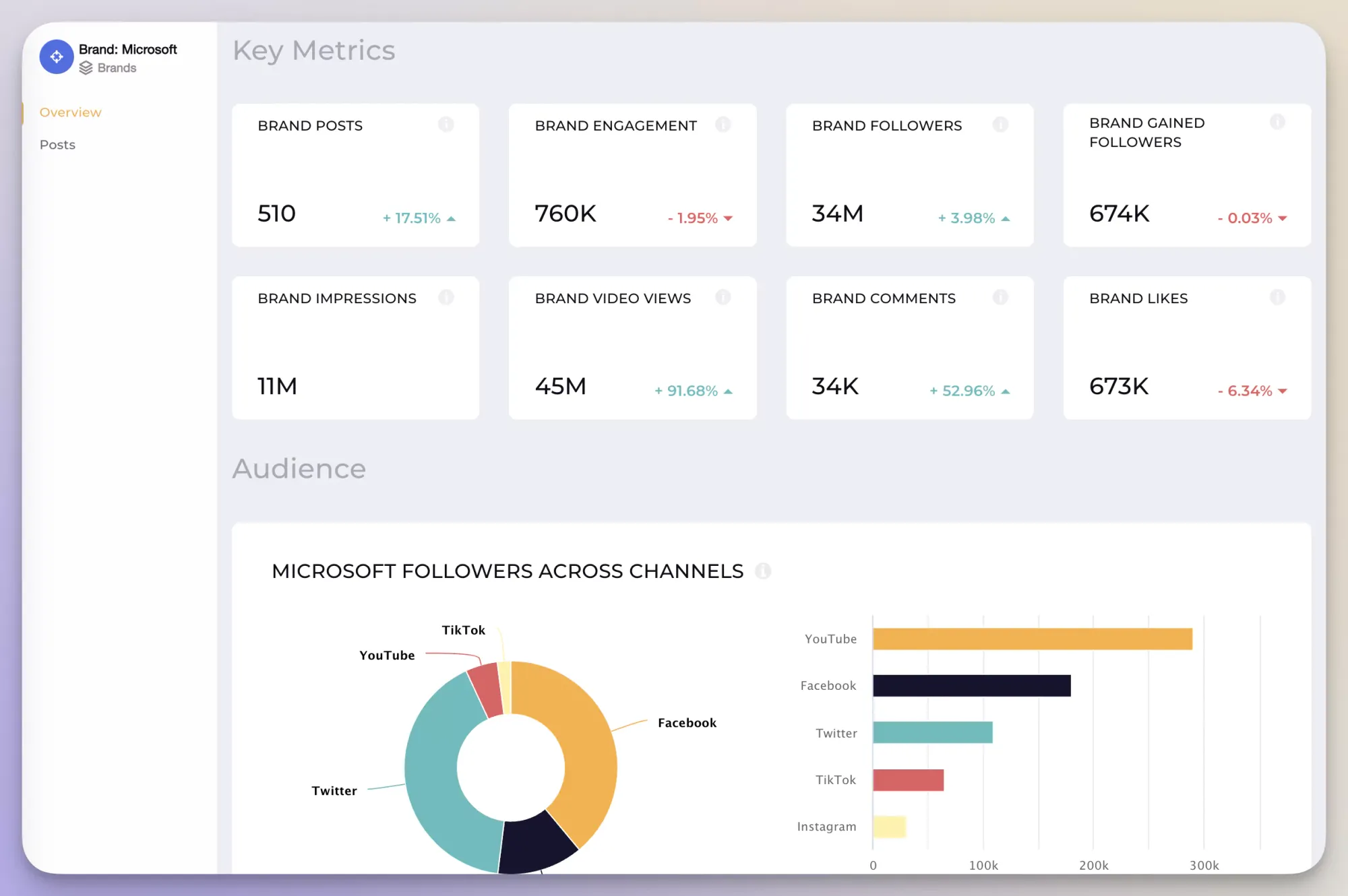
#2. Campaign tracking
The second category of social media measurement involves a more focused view of results.
For example, if you create a social media campaign around a product launch or a special occasion such as Black Friday, you want to get insights into how effectively that specific campaign performed and whether you had a positive return on investment. Using tools like LinkedIn Analytics for LinkedIn campaigns can provide valuable insights into campaign-specific reach, engagement rates, and conversions.
This focus on campaign-specific metrics helps you understand what worked well for that particular campaign and allows you to refine your approach for future efforts.
Here, you'd track metrics like:
- Campaign reach to understand how many people saw campaign-specific content.
- Campaign engagement rates to analyze how well each campaign asset was able to spark interest.
- Click-through rates to see how many people clicked on links in your posts.
- Conversion rates to understand how many people who saw your post actually bought something
Each social media measure is necessary to understand performance and refine strategies.
But do you really need to wrap your head around all the specifics of social media measurement?
After all, it seems quite complicated, doesn’t it (48% of B2B marketers think so)?
You can start by tagging posts using campaign hashtags or keywords and understand which ones perform better in terms of social media platform and engagement metrics.
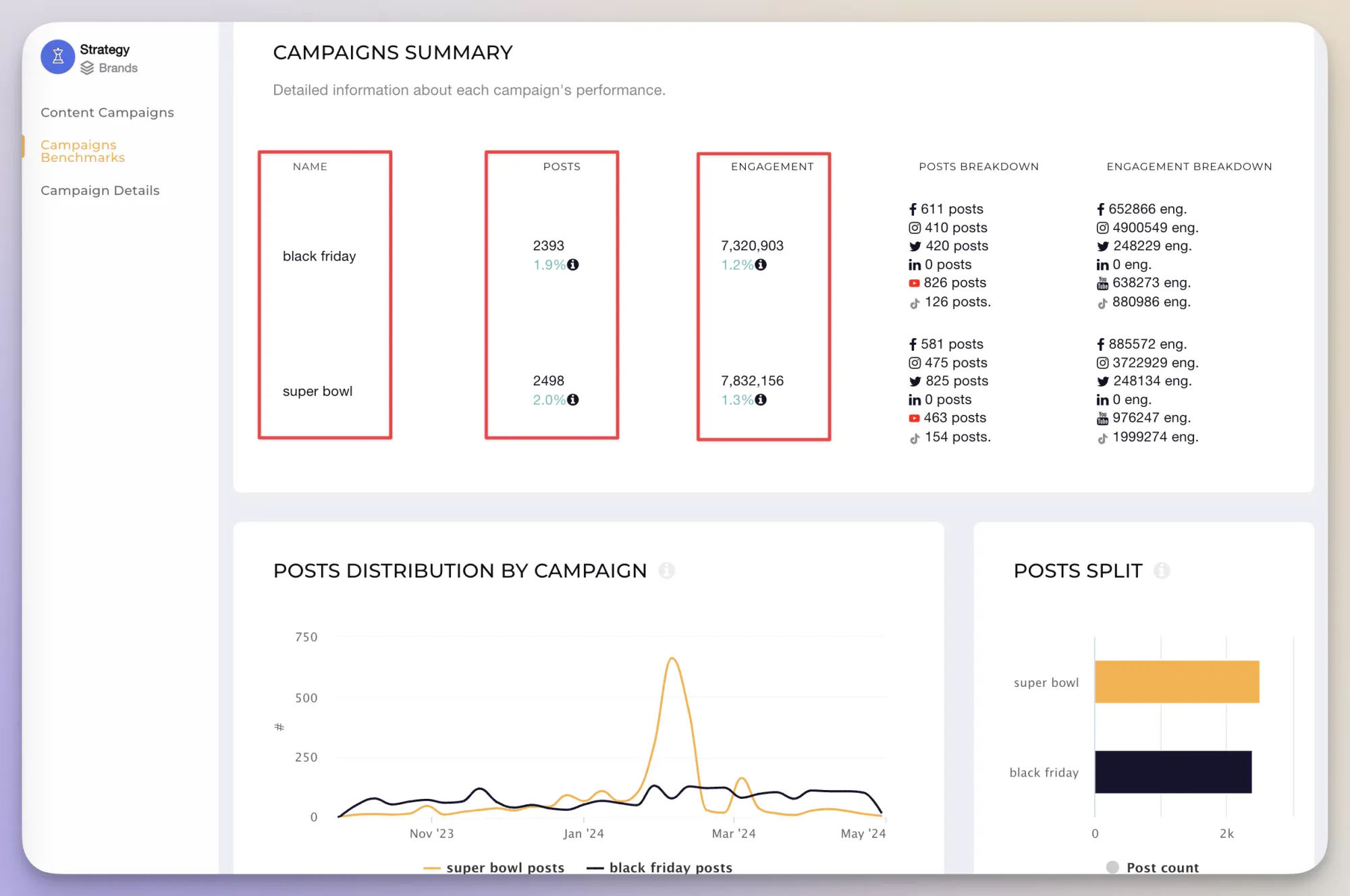
6 benefits of using social media measurement
Learning how to measure social media metrics is like getting marketing superpowers.
When you measure what's working and what's not, you not only get a ton of useful info (which you can share with everyone in your organization), but you can make smarter choices and get more value out of your efforts.
Plus, you can fix what's not working quickly before it becomes a problem for the citizens of social mediaville.
Let’s look closely at social media measures that can help you put your business growth cape on.
1. Understand audience behavior
Social media listening and measurement provides deep insights into your audience's behavior, preferences, and engagement patterns.
Metrics such as likes, shares, comments, and reach help you better understand what content resonates with your audience and tailor your strategy accordingly. This understanding leads to more relevant and engaging content that creates stronger connections with your followers.
2. Create more impactful campaigns
As we said, tracking specific campaigns is key. It lets you see exactly how each one did and what you can tweak next time.
Think of it like improving a recipe. Every time you cook a meal, you notice what's missing and what spices could be added (or removed) to make it more delicious. You wouldn't cook the same dish that nobody likes over and over again, would you?
Similarly, social media data helps you improve your campaigns with every iteration, making them more impactful and bringing you closer to having satisfied customers.
3. Optimize resource allocation
Brands that accurately measure the effectiveness of their social media campaigns can allocate resources more efficiently.
Identify the platforms and content types that deliver the best results and ask your team and collaborators to focus their efforts there. Decide where your budget is best spent and where you need to be more cautious with your money.
4. Gain a competitive edge
Social media measurement tools allow you to analyze your competitors' activity and impact and compare their performance with your own.
Competitive analysis like the one above facilitated by Socialinsider helps you identify industry benchmarks and uncover opportunities to differentiate your brand.
By understanding where you stand in relation to your competitors, you can develop strategies to not lag behind or, even better, be a step ahead of others.
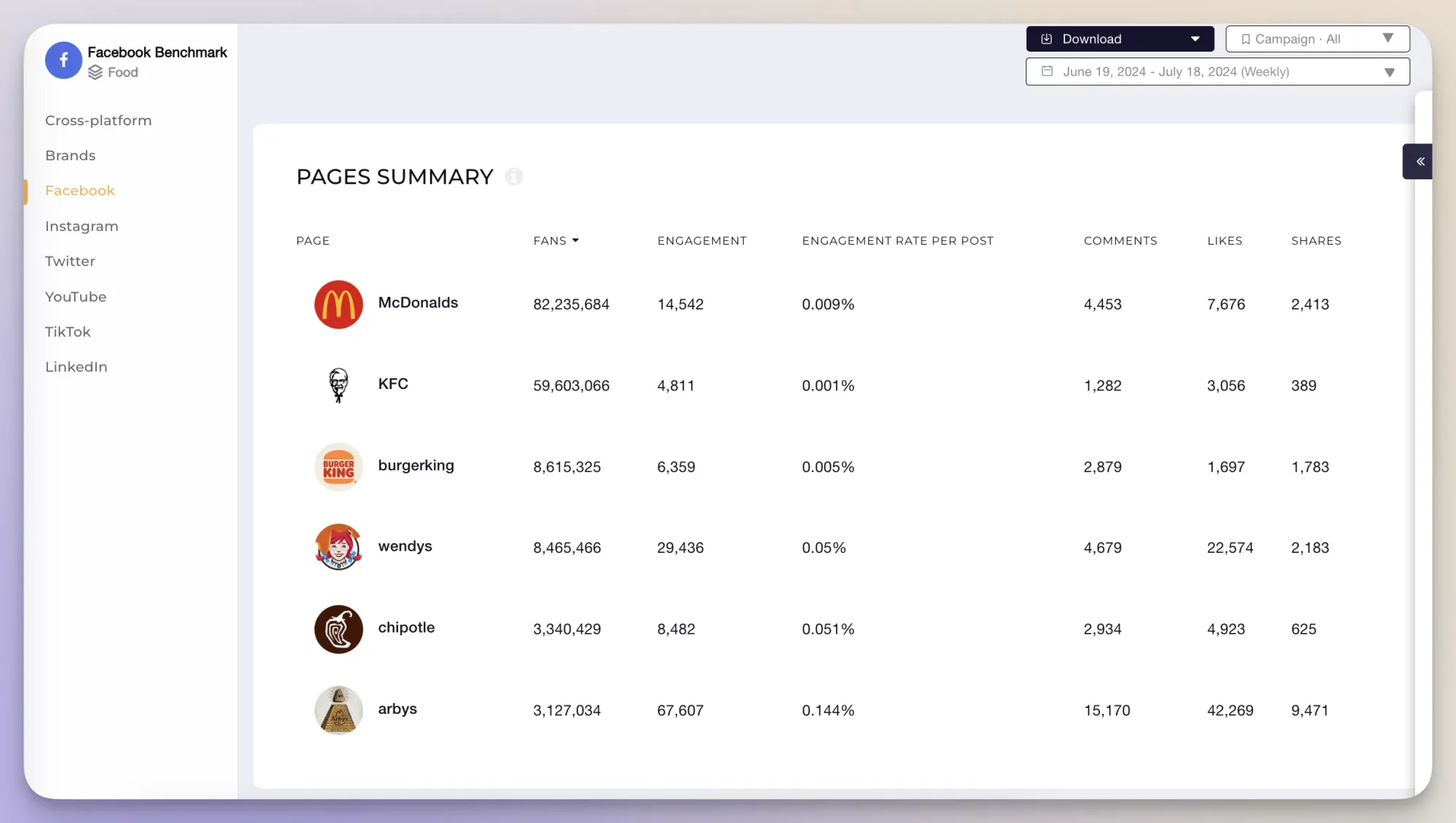
5. Make strategic decisions
Forget social media guesswork. It's true that platform algorithms can be unpredictable, but data helps you put order in the apparent chaos.
An effective social media measurement program provides the data needed to make informed strategic decisions. Tracking and measuring social media performance enables you to identify trends and patterns that inform your long-term strategy.
6. Enhanced reporting and communication
Data organized in comprehensive dashboards helps with reporting and communicating social media measurement findings more effectively.
Clear reporting helps stakeholders understand the impact of your social media activities and the value they bring to the organization. This transparency helps you gain trust and support (and bigger budgets) for your social media initiatives.
Now, doesn’t all that sound like marketing superhero work?
Great, let’s continue with the six steps that will get the measurement job done.
6 steps to get started with social media measurement
If you're struggling to measure the performance of marketing activities, you're not alone.
"Social media today is a mess," says Maggie Carey half-jokingly in an episode of The Life of a Social Media Manager podcast. She explains that trying to keep up with all the platforms, old and new, is a real challenge that has escalated over the years.
While social media channels provide access to detailed social media reports and data, making sense of it all, drawing coherent social media insights and trends, and reporting further to stakeholders is a big hill to climb — especially when working with limited resources.
The steps below are based on social media best practices and provide structure to the process while ensuring you don't miss important elements.
1. Set the goals for social media measurement
Setting clear goals is a critical part of social measurement. To create an effective social media measurement plan, start by defining success for your business.
Ask yourself (and your team) essential questions such as:
- What do we need to know?
- Where can we find this information?
- How will we use the data?
As highlighted by Simplilearn, most of the goals for measuring social media efforts can be included in one of these two categories:
- Measuring social media ROI - are your efforts actually paying off?
- Driving continuous improvement - gaining the knowledge necessary to make the efforts more effective over time.
Within those two categories, you can include goals such as increasing brand awareness, improving engagement, capturing leads, driving more sales, or building a community around your brand.
Social media goals should be specific, measurable, achievable, relevant, and time-bound (SMART).
For example, you might aim to increase brand awareness by tracking metrics such as reach, impressions, and share of voice. Alternatively, if your focus is on driving sales, you might measure conversion rates and revenue generated from social media campaigns.
In other words, make sure that social media metrics align with your objectives so you don't get overwhelmed by data.
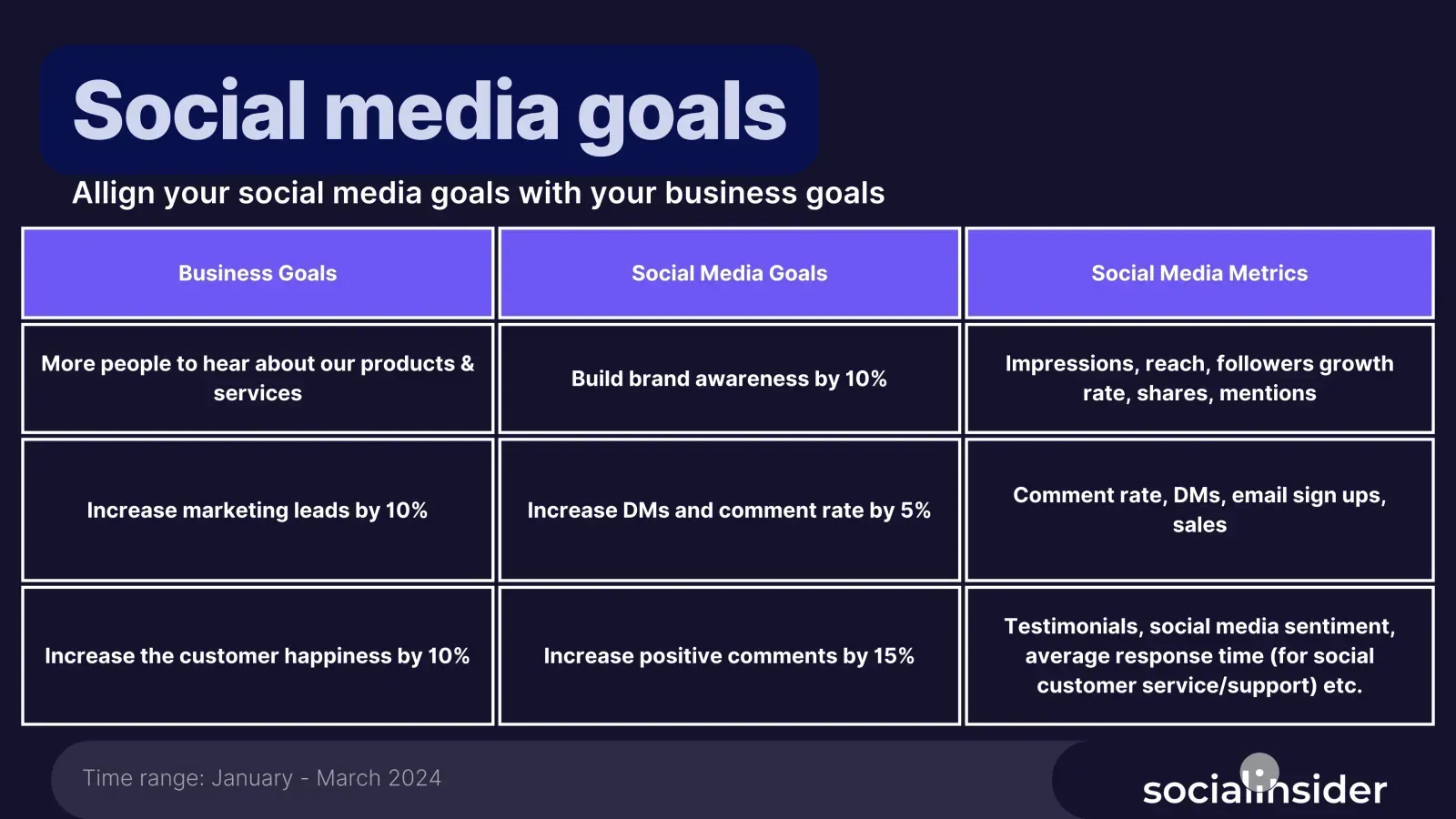
2. Select the social media metrics to track
Tracking the right social media metrics will help you understand whether you're moving towards achieving your goals.
Here are the key metrics to consider:
Reach and impressions
Reach measures the number of unique users who see your content, while impressions count the total number of times your content is displayed.
Tracking reach vs impressions helps you understand the visibility of your content.
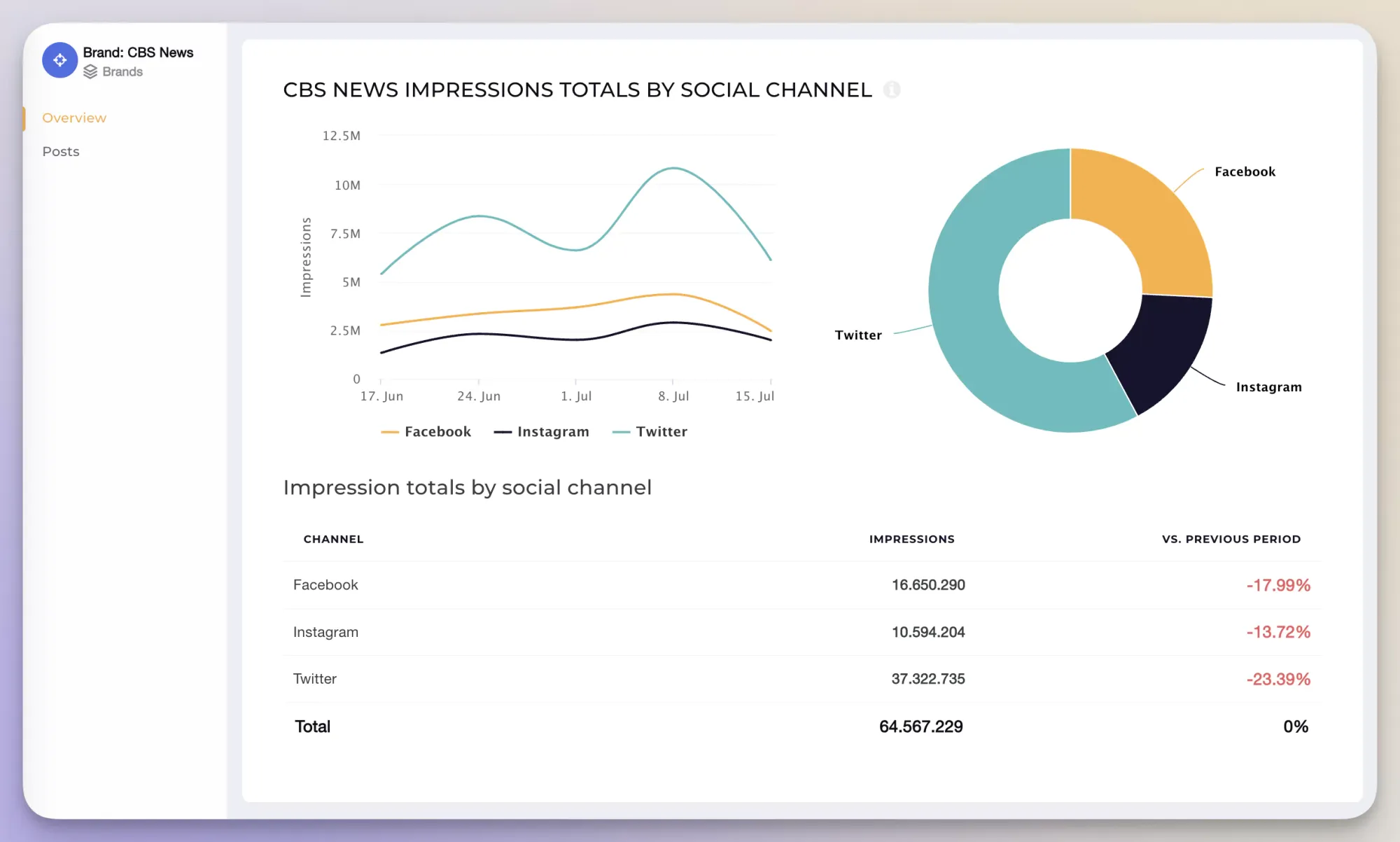
Engagement metrics
Engagement metrics provide insights into how users interact with your content.
Key metrics include reactions (likes, loves, etc.), comments, shares, saves, total engagement, and engagement rate on social media. These metrics help measure how well your content is doing in sparking people's interest in it.
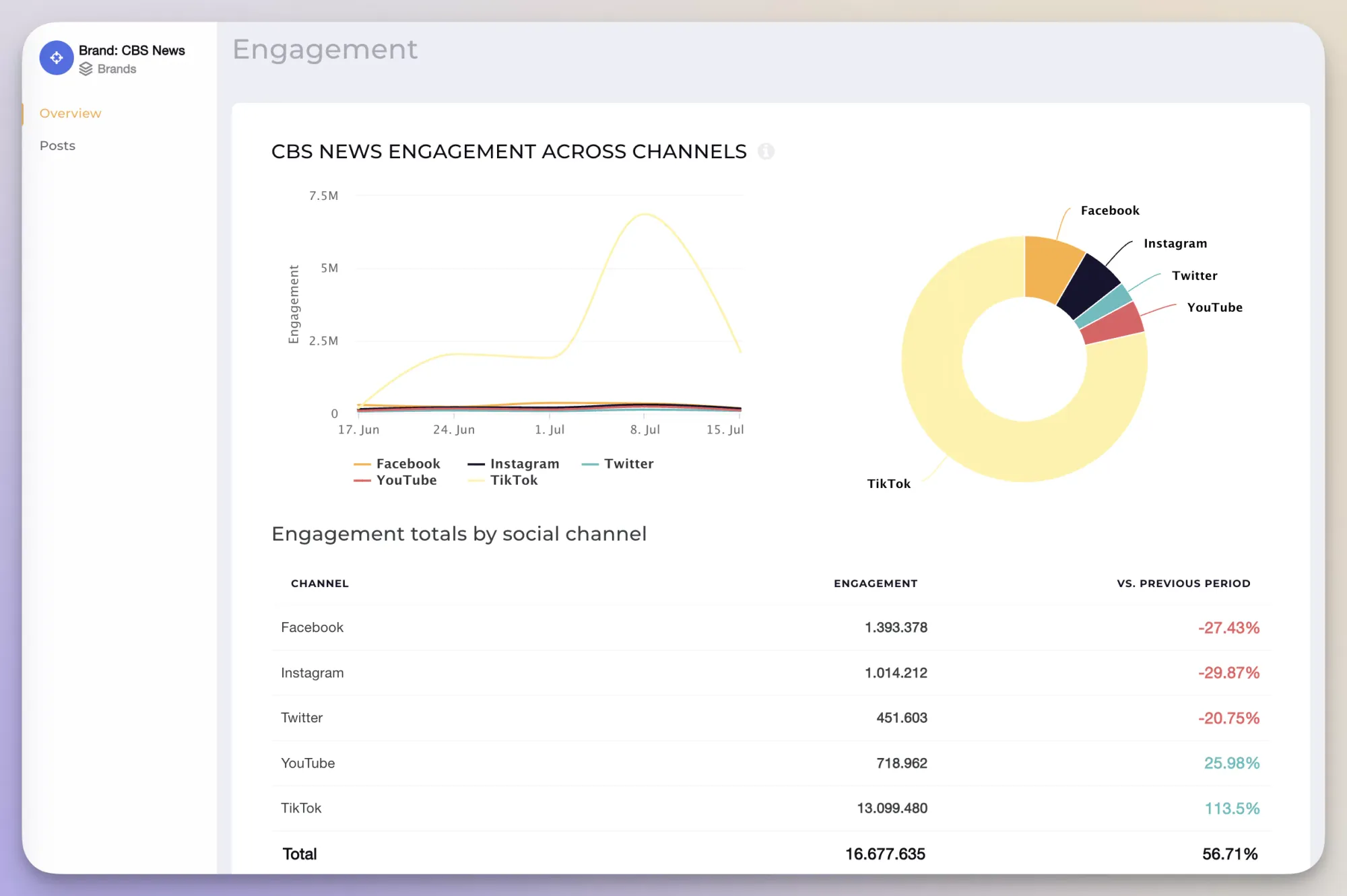
Follower metrics
Follower metrics include the total follower count and follower growth metrics. Monitoring these metrics helps you assess your audience's growth over time.
Remember that follower growth alone is not enough to understand performance. It needs to be coupled with other metrics, such as reach and engagement.
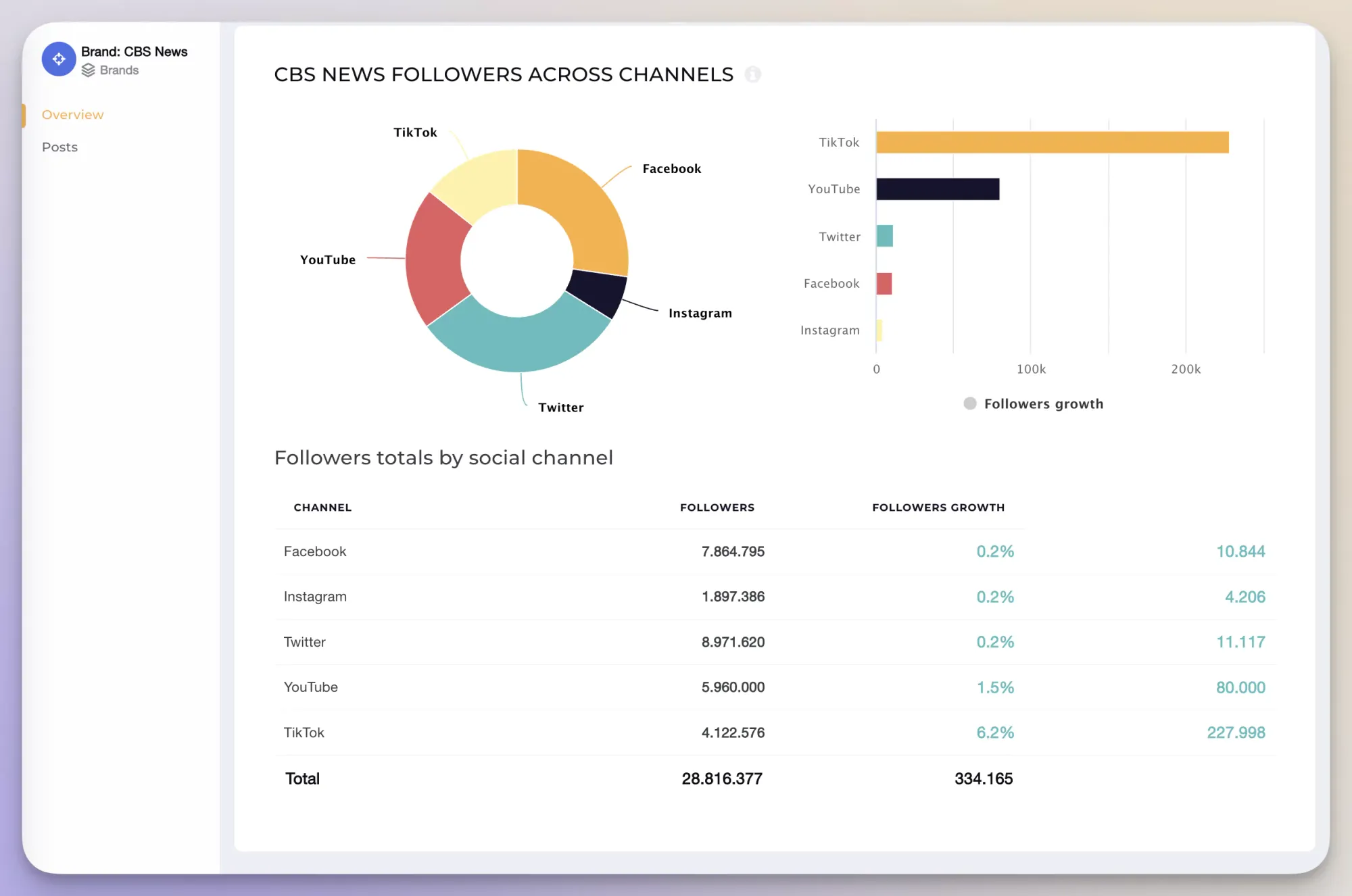
Traffic metrics
Traffic metrics focus on how social media drives traffic to your website. Key metrics include click-through rate (CTR) and referral traffic, which show the effectiveness of your social media in driving website visits.
Conversions metrics
Conversion metrics track actions that lead to business goals, such as sales or sign-ups. Key metrics include conversions and conversion rate, which measure how effectively your social media activities drive desired actions and, ultimately, social media ROI.
Brand awareness metrics
Brand awareness metrics track the visibility and impact of your brand on social media. Brand measurement techniques are based on metrics such as brand mentions and share of voice, which measure how often your brand is mentioned and compared to competitors.
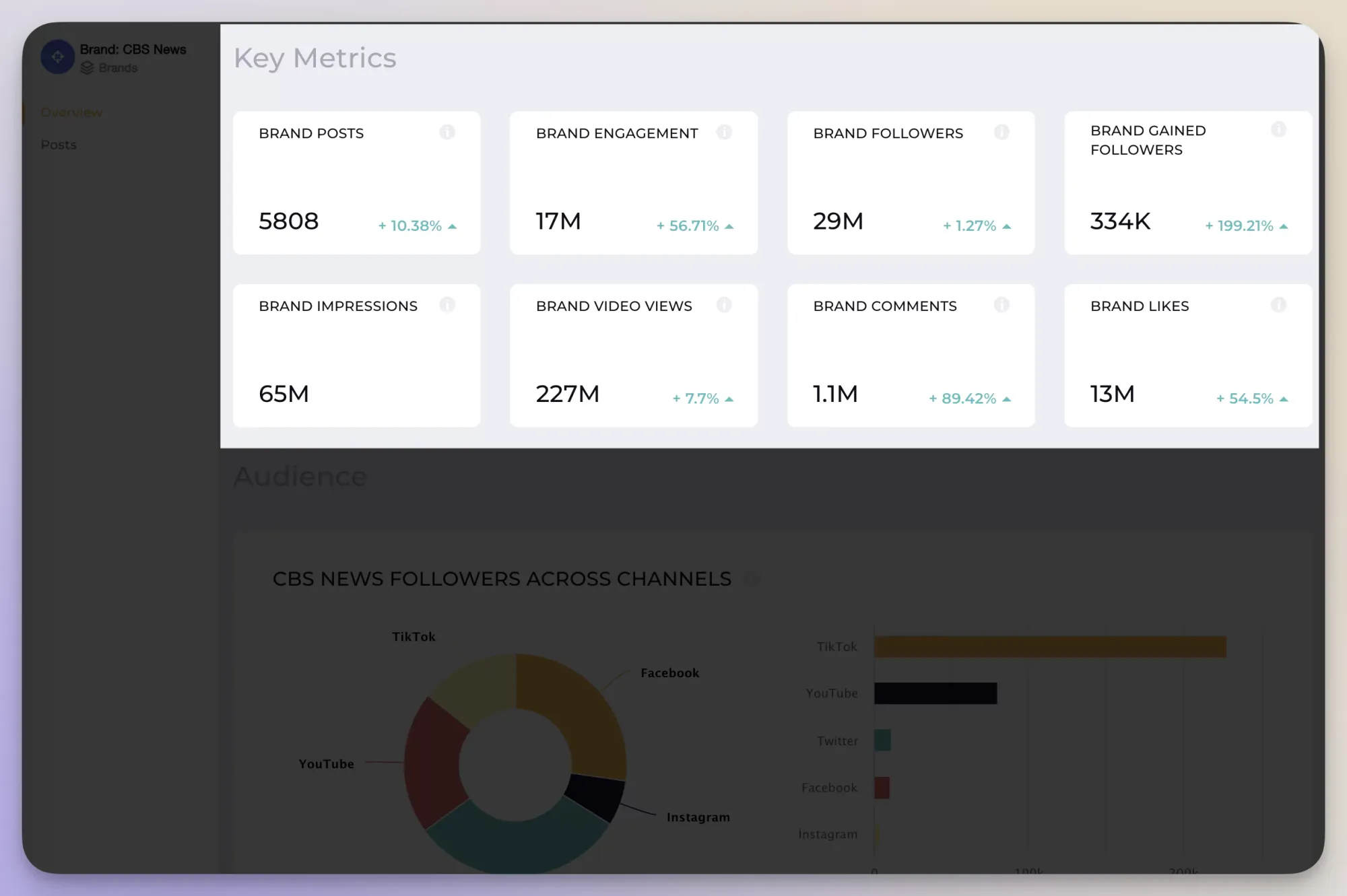
Sentiment analysis metrics
Sentiment analysis evaluates the tone and emotion of social media mentions about your brand.
Through social listening methodologies, you understand public perception, identify areas for improvement, and prevent any reputational damage.
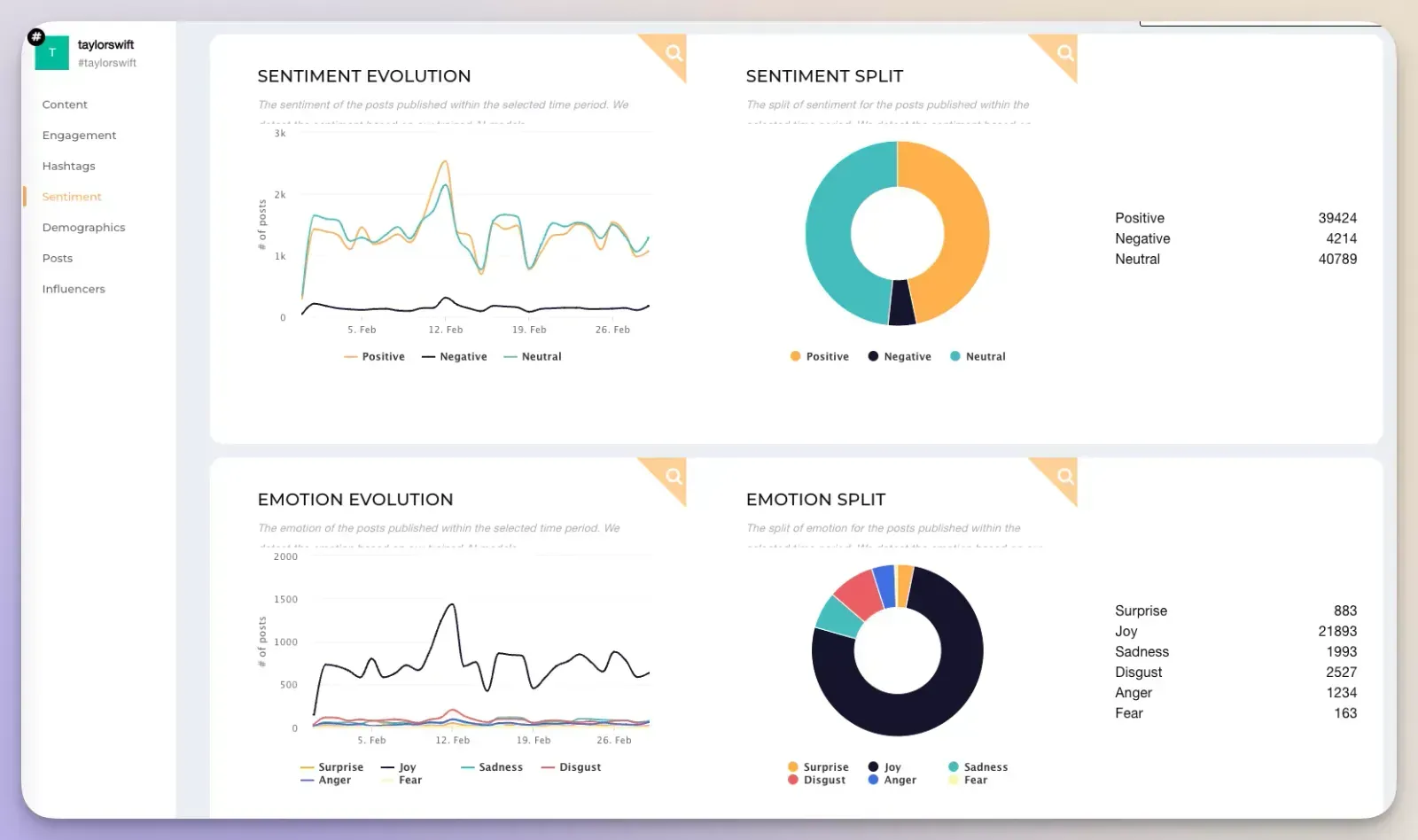
Content performance metrics
These metrics identify your top-performing posts and analyze social media content pillars. Tracking content performance helps you determine which types of content resonate most with your audience.
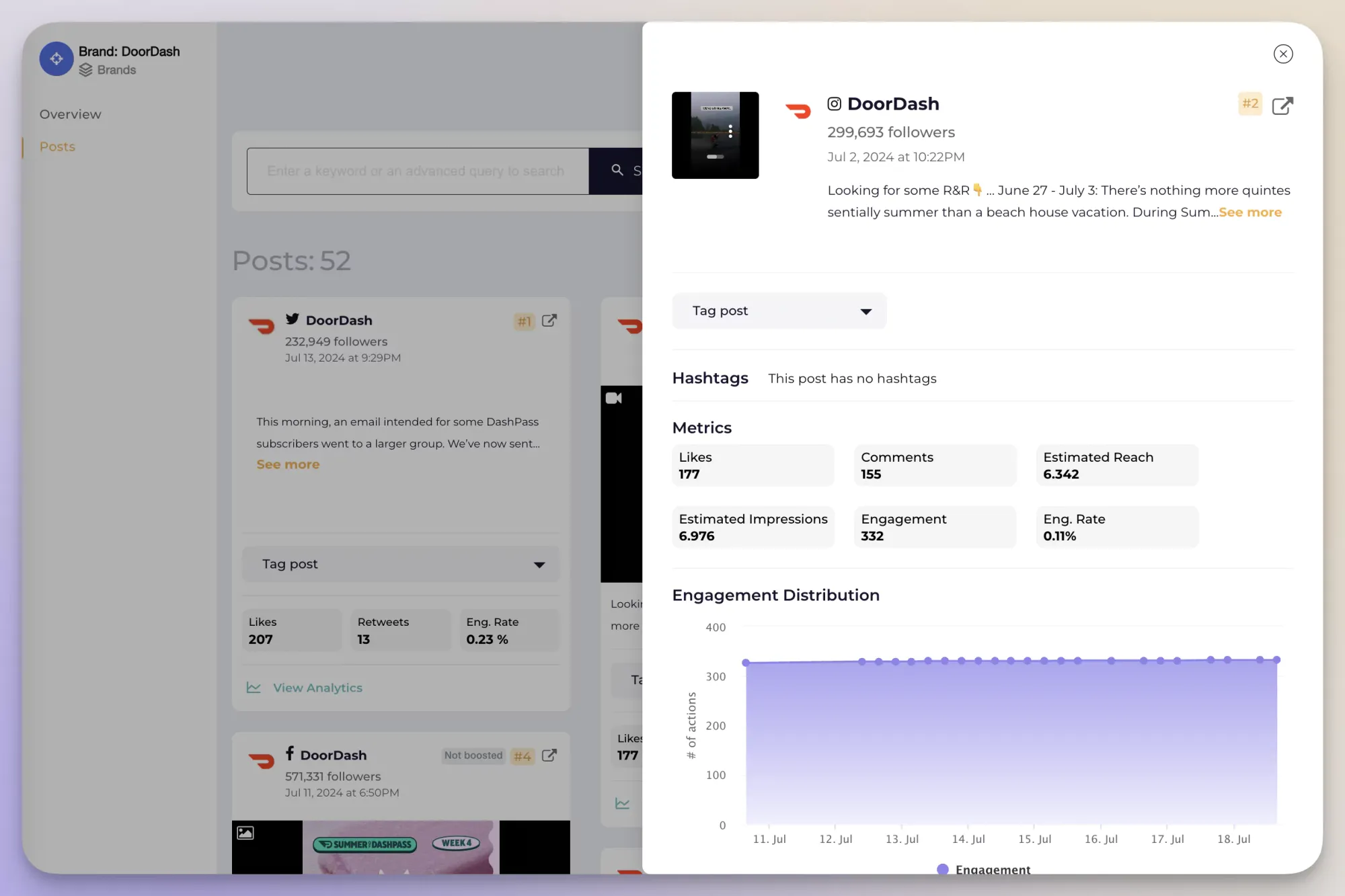
Audience demographics
Audience demographic data includes information about age, gender, location, and language. Psychographic data covers interests, behaviors, and lifestyles. Understanding your audience helps tailor your social media content and strategy to their preferences.
Customer service metrics
Customer service metrics measure the efficiency of your social media customer support. Relevant metrics include response time and resolution rate, for example, indicating how quickly and effectively you address customer queries and issues.
Influencer metrics
Influencer metrics evaluate the impact of influencer marketing campaigns.
Make sure to track metrics such as influencer engagement (interactions with influencer posts) and influencer reach (the size of influencers' audiences) to analyze how well those partnerships promote your brand and products.
Video metrics
Videos on social media is everyone's darling these days, so it's important to keep a close eye on its performance. Video metrics assess the performance of video content through the number of views, watch time, and completion rates.
Different metrics will be relevant to your specific strategies, and metrics may change depending on specific campaigns. For example, if you run an awareness campaign on TikTok, video metrics will be key, while an Instagram campaign with multiple partnerships will focus on influencer metrics.
Select the metrics that help you gain a comprehensive understanding of your social media performance and support data-driven decisions for your specific social media marketing strategy and goals.
3. Choose the right social media measurement tools
Selecting the right social media analytics tools is essential for accurately measuring the effectiveness of your social media campaigns.
Here are three recommended tools to make social measurement not only easier but more relevant to your business:
Socialinsider
Socialinsider is a comprehensive social media measurement tool that provides in-depth analytics across various social media platforms.
It offers insights into engagement metrics, follower growth, and content performance, enabling you to measure and analyze your social media campaigns effectively.
Socialinsider also helps you perform advanced competitor analysis, giving you invaluable insights into competitors' performance across platforms.
Google Analytics
Google Analytics is a powerful tool for tracking social media traffic and referrals.
By using UTM parameters, Google Analytics can help you understand how your social media efforts drive traffic to your website. It provides detailed reports on user behavior, conversion rates, and the ROI of your social media activities, allowing you to measure the success of social media marketing campaigns.
Zendesk
Ideal for tracking social media interactions for customer support, Zendesk allows you to measure response times, resolution rates, and overall customer satisfaction.
Integrating customer service metrics into your social media measurement plan helps you ensure that your social media efforts not only engage your audience but also provide excellent customer support.
4. Benchmark your performance
So, you've identified and tracked your KPIs. But the numbers themselves don't tell the whole story.
To gain real insights, you need to benchmark your performance. This involves comparing your metrics against industry standards and your competitors' data.
By understanding how your social media presence stacks up, you can showcase the true impact of your KPIs.
- Analyze data and draw insights. Data analysis is where the magic happens. Here, you discover trends and patterns within your data. Is a specific type of content more engaging? Are certain demographics more interested in your content? These insights help you transform raw numbers into actionable intelligence.
- Optimize your social media strategy. Armed with the knowledge of what's working and what's not, you can optimize your approach. This might involve tailoring content formats, adjusting posting schedules, or refining your target audience.
Remember, social media changes fast, and so must you.
Measuring, analyzing, comparing, and optimizing is a continuous process that helps you remain efficient and competitive. Social media benchmarks also inform stakeholders, ensuring social media actively supports business growth.
5. Stay clear of social media measurement blindspots
A critical part of social media measurement is avoiding mistakes. While social measurement offers a wealth of information, it's easy to fall into traps that hinder your effectiveness. Be aware of these common blindspots:
- Data deficits. Without sufficient data, you're flying blind. Track a variety of relevant metrics to build a comprehensive picture of your social media performance.
- Data overload. Too much data can be paralyzing. Focus on the KPIs that align with your goals and prioritize analyzing them for actionable insights.
- Working in siloes. Data is ineffective without context. Benchmark your performance against industry standards and competitor data to understand your position within the landscape.
- Misguided metrics. Tracking the wrong metrics translates into wasted effort. Choose KPIs that directly connect to your social media goals.
- Customer journey disconnect. Social media is rarely a direct sales channel. Understand how social media interacts with the broader customer journey to assess its true impact.
- Budget limitations. Performant social media analytics tools can be expensive, but that doesn't mean you should get none. Explore affordable options that offer the social media analysis level you need.
- Missing expertise. Data is only as valuable as the insights it reveals. If your team lacks analytical expertise, consider additional training or outsourcing. Measurement tools can also replace or complement expertise to a certain point.
6. Keep up with social media measurement trends and technologies
With the integration of AI marketing tools, social media measurement will not look the same in the future.
It's already happening: AI is revolutionizing how businesses interpret vast amounts of social media data, enabling more accurate insights and predictive analytics. And it’s only the beginning.
New technologies don't only automate routine tasks but also uncover patterns and trends that human analysts might overlook.
They help organizations make data-driven decisions faster, optimize their social media strategies more effectively, and ultimately improve their digital presence.
So, keep an eye on these technologies and choose media measurement software that leverage AI to make sense of social media complexities with greater precision and agility.
Final thoughts
To improve our marketing strategy, you need to understand how to measure social media effectiveness accurately.
By tracking the right metrics in your social media dashboard, you can refine campaigns, allocate resources more efficiently, and stay ahead of competitors. All this is much simpler with the right social media measurement tools.
Try Socialinsider for free to unlock the full potential of social media data and be the analytics superhero your brand needs to make better data-driven decisions.
FAQs about social media measurement
How often should I measure my social media performance?
Measuring social media performance should be an ongoing process. Daily and weekly monitoring helps track real-time social media engagement, monthly analysis provides insights into trends and patterns, and quarterly or yearly reports evaluate overall effectiveness. Regular measurement ensures timely adjustments and continuous improvement and keeps social media efforts aligned with broader business goals.
What are the challenges of social media measurement?
Data overload, integrating data from multiple platforms, accurately attributing social media activities to business outcomes, adapting to changing platform algorithms, and balancing qualitative and quantitative data are some of the most common social media measurement challenges. Overcoming these obstacles requires a focus on the relevant metrics and using comprehensive social media measurement tools.
What are the most common mistakes to avoid when measuring social media success?
Common mistakes include focusing solely on vanity metrics, neglecting the context of data, ignoring negative feedback, lacking clear objectives, inconsistent measurement, and failing to adjust strategies based on data insights. Avoiding these pitfalls ensures a more accurate and actionable understanding of social media performance.
